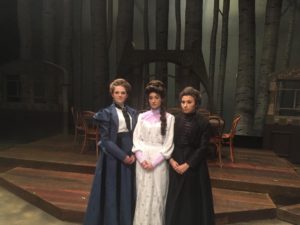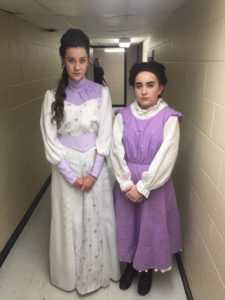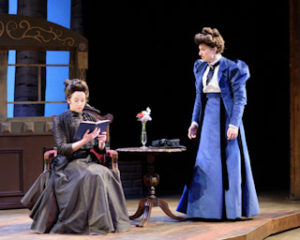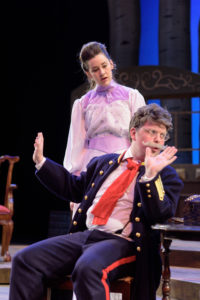Chekhov’s “Three Sisters” — A Triumph for Oklahoma City University

Sage Tokach (Olga) with Marae Marae Narvaez (Irina) and Kaiden Lynn Maines (Masha) in Chekhov’s “Three Sisters”
Anton Chekhov is considered one of the masters of Russian literature and he is noted for his plays as well as his short stories. “Three Sisters” was written in 1900 and premiered in 1901 with Konstantin Stanislavski directing as well as appearing as Lt. Col. Vershinen. The play is certainly a tragic story of a family as the hopes and dreams they cherish fade along with youth. Yet moments of mirth appear occasionally, and brief visions of the natural gaiety in their personalities are a delightful counterpoint to the Russian dreariness in the provinces. The setting is a small provincial town, and the population is faced with unrest with the revolution hovering on the horizon. It is only a few short years before the uprising in 1905 that forced the Czar into a the concession of a constitution, the initial step of the great Russian Revolution fought during the Great War, the first World War. Such is the discontent overall that colors the discontentment the three sisters have in their personal lives.
The play opens on the one year anniversary of their widowed father’s death, also the name day of the youngest sister, Irina. Besides Irina, the eldest sister Olga is a school teacher and the middle sister is Masha who is married to an instructor. Their only brother, Andrey Prosorov plans to become a university professor and has a wonderful future ahead of him. A cultured, educated family as their father, who had been a soldier, wished. The siblings are excited as they plan to move to Moscow where they grew up. Moscow has become a magical place where life will be much better. As the play progresses, life turns out quite different from their plans, the prospect of moving to Moscow fades as well as all their hopes and dreams. Olga is a dedicated school teacher but also dreams of marriage, yet she is destined for spinsterhood. Masha was once impressed with her schoolmaster husband but he has become shallow and silly. Irina is quite young and dreamy, and she knows that she will find her one true love in Moscow. Brother Andrey is destined for greatness in the University setting he envisions, but, he falls in love with a woman who is not cultured. Natalia is rather crude instead of refined as his sisters are and she soon shows her true, cruel colors.

Marae Narvaez (adult Irina) and Lily Marsh (child Irina) from Anton Chekhov’s “Three Sisters”
Lance Marsh directs “Three Sisters” with distinction, taking great advantage of OCU’s assets. His adaptation reveals his directing skills as each character is shown with clarity and the play is definitely one that true performers relish. Oklahoma City University is well known as a source of talent and Marsh draws heavily on that talent. This cast is excellent; the sisters and sister-in-law are all superb actresses. Sage Tokach is Olga and her poignant portrayal of the spinster teacher is rather inspired, as we glimpse a woman of passion lurking underneath. Kaiden Lynn Maines is Masha, earthy, womanly, her passion is obvious, and her frustration is in her struggle with dishonor versus honor. Marae Narvaez is the young Irina, too young to understand passion yet, she dreams of chastely kissing a fairytale lover on a warm summer night. Dawson MacLeod is brother Andrey; somewhat of a prodigy, destined for greatness with deep intelligence, but he chooses his wife quite foolishly and becomes a caricature instead of a man of character. Gage Rancich is Feodor Ilitch Kuligin the patient devoted husband to Masha. Jaqueline Bennet is Natalia the rather coarse beauty that enchants Andrey but retains no interest in maintaining her demure and shy façade after landing her husband.
They live in a provincial town populated largely by soldiers stationed nearby. Many of them have made a practice of visiting Irina and Olga in the home they still share with their brother. Masha and her husband visit frequently, and the house become quite the preferential gathering locale for the soldiers, as a place of fun and relaxation where pretty girls live. Exceptional performances are given by Austin Wyatt as Alexander Vershinin, Jordan T. Cobb as Nicolai Lvovitch Tuzenbach (the Baron) who loves Irina, Alec Espinosa as Vassili Vassilevitch Solyony who is a rival for Irina’s affection, and Matthew Tuley as Ivan Romanovitch Chebutikin the older, not so much wiser, soldier’s physician.
The cast is large but each and every performer shines as a pearl hidden away in the bleak Russian steppes. Jordan Dorsey is Alexey Petrovitch Fedotik, another soldier who has fallen under Irina’s spell. His cheerful demeanor is handled beautifully. Dorsey particularly shines when he maintains his cheerful outlook after losing all possessions in a fire; this characterization is crucial to the development of “Three Sisters” that Chekhov achieves. Tyler Malinauskas is Vladimir Carlovitch Rode has some wonderful moments on the stage and his performance highlights the gratitude these soldiers have for the Prosorov family sharing their lives and bringing a touch of home to lonely soldiers. Gareth Forsberg plays General Prosorov the father in a short but wonderful flashback as the sisters remember the delights of Moscow. Forsberg also handles the role of Ferapont, an elderly man who is hard of hearing and possibly slightly dotty. Every awkward moment he creates as he blurts out interesting trivia of Moscow allows wonderful opportunities to the other actors. They never fail to take advantage of those moments.
Emily Diaz is incredible in the short, sweet role of the elderly maid, Anfisa. Diaz plays the woman in her 80’s with sensitivity, accuracy and she is also amazingly amusing—just enough to relieve the tragic aspects, even as she faces her own tragedy at the cruel hands of Natalia Ivanova, Andrey’s wife. The opportunities for Shelby McCarver to shine are few; however she takes full advantage of every one of those opportunities, becoming equally essential to the overall ambiance of the production. Additionally this production has three extra cast members. In his adaptation, Marsh has included flashback moments with the three sisters as they were when they were happy children living in Moscow before the death of their parents. The three have no speech, but the appearance says volumes. These actresses should be recognized for great skill in creating viable and understandable characters through movement and expression only. They are Emma Grey as young Olga, Gabriella Batista’s as young Masha and Lily Marsh as young Irina. It isn’t always easy to portray a child and these girls do so with strength and realism. With an original adaptation it can be a gamble to add a flashback as it can be confusing. Marsh’s adaptation pays off brilliantly as this version actually assists the audience in understanding the play on an emotional level and in no way distracts from any other scenes. This excellent adaptation is one that many other directors may wish to use in future productions, and is an example of Marsh’s diverse talent.
The span of years in which the action takes place is not long, and the young characters must age slightly, through young adulthood, and every one of them ages beautifully, realistically and visibly. Aging slightly is a difficult challenge and they all meet it exquisitely.

In the Second Cast of “Three Sisters” shown are Cami Grindall as Masha (seated) and Onnika Hanson as Olga (right)
The four women starring in this show, Jaqueline Bennet, Sage Tokach, Kaiden Lynn Maines and Marae Narvaez are all beautiful examples of the exceptional talent found at Oklahoma City University. The casting is perfect. However, it should be noted that there are no disappointed actresses in this show because these four roles have been double cast. The actresses that are not seen on opening night, Thursday, April 5, 2018 are quite different, and they create a perspective that is equal in perfection, while retaining their own individual integrity. These actresses should not be overlooked by any critic even though they cannot be criticized. According to Marsh’s assistant director, Emily Tryon, they are also exceedingly talented. They are Onnika Hanson as the oldest sister, Olga, Cami Grindall as the married sister, Masha and Gracie Lewis as the impressionable young Irina. The crass Natalia (often called Natasha) is done by Sarah Keast. It matters not which cast is seen to enjoy “Three Sisters” thoroughly. It may only be of concern to those connected to one of the actresses on a personal level so patrons who are family members should double check with the box office when making reservations.

Gracie Lewis as Irina stands behind the Doctor, Ivan Romanovitch Chebutikin played by Matthew Tuley
This production is such that no equity theatre would be hesitant to credit and claim, and once again, OCU theatre students exhibit quality that is both stellar and grounded. Marsh directs the cast with the attention to detail that encourages a profound connection with the audience. He also delegated with absolute success using students in key technical positions. Emily Tryon’s contribution as assistant director and Katelynn Foster’s significant work as stage manager are invaluable assets to the production, and the importance of Ale Speight’s supplemental assistance as dramaturg is undeniable. The visual impact of Dustin Bielich’s scene design is monumental and paired with Celia Kasberg’s costume designs is very effective and beautiful yet sometimes stark and dreary as Russian literature invariably can be. Claire Police handles the properties and this job is stressful and crucial as the play moves forward. She ‘polices’ the location of the properties simplifying the concerns of the cast, and Police is another unsung hero that is found backstage. Chase Stryhal is an excellent sound designer using the ideal decibel and tonal levels for sound effects. These students have made the production successful.
The hard work by OCU staff is equally important. The mood is primarily created through the lighting and Aaron Mooney is OCU’s Resident Lighting Designer and Associate Professor of Lighting Design. The mood varies in “Three Sisters” and his subtlety is a powerful addition to the show. Luke Thomas Eddy teaches Movement and Stage Combat at OCU and his work as the movement coach is visible, and allows the performers to be confident as well as smooth. Kate Brennan is Assistant Professor of Voice & Acting at OCU and her work as the Vocal Coach is uncommonly important. Chekhov is ‘wordy’ a common trait in Russian drama and Brennan’s work as vocal coach is one actors and directors must rely on. The voices in this production sound fresh and clear as the play draws to a close; just as expressive at 10:00 pm as at 8:00 pm when the curtain goes up.
“Three Sisters” plays through the Sunday matinee, April 8, 2018, and is a play that should be seen. While rather long, it doesn’t seem long at all which is often unusual for the Russian tendency to be quite wordy! The performers capture and keep the attention of audience members with ease. “Three Sisters” is performed on a beautifully designed set with technical perfection in all arenas. Visit the box office at OCU at www.okcu.edu or call 405-208-5227 for tickets. The University is located at 2501 N. Blackwelder, and the Burg Theatre would be nearest to the 25th street intersection. For those not familiar with the campus, ask the box office for parking suggestions and directions. “Three Sisters” is one of Chekhov’s best plays, and this production is one of the best for D. Lance Marsh, director, professor and mentor.